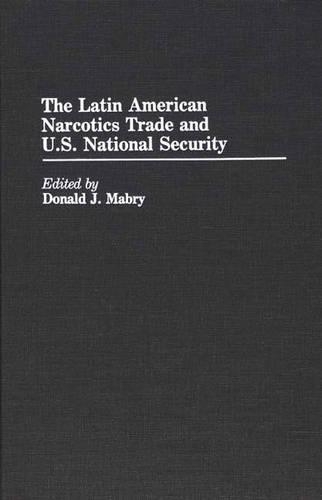
The Latin American Narcotics Trade and U.S. National Security
(Hardback)
Publishing Details
The Latin American Narcotics Trade and U.S. National Security
By (Author) Donald Mabry
Bloomsbury Publishing PLC
Praeger Publishers Inc
16th November 1989
United States
Classifications
Tertiary Education
Non Fiction
International relations
Crime and criminology
Drugs and alcohol: social aspects
363.450973
Physical Properties
Hardback
216
Description
The Latin America narcotics trade is a national security issue for the United States because it is destabilizing Latin American allies and creating social problems within the United States. Frustration with the inability to block the flow of cocaine, marijuana and heroin from Latin America prompted passage of major national anti-drug laws in 1986 and 1988. Throughout the decade, United States narcotics policy has created friction between the United States and Latin America yet, according to Mabry, it has essentially failed in its goals. This book deals with the issues of United States narcotics policy and offers recommendations for future action. The history of the United States narcotics policy, the nature of the trade, the debate over the use of the United States military in interdiction efforts, the role of Congress in making policy and the origin and implementation of narcotics policy, be it directed against a specific nation of against the entire region, are presented. In addition, the book contains a list of tables covering: consumption of drugs and Columbian trafficker's investment preferences.
Reviews
This edited volume is based on conference papers; a number of essays also appeared in the Journal of Interamerican and World Affairs (Summer-Fall, 1988). Since this is a fast-changing field, particularly as it relates to national security issues and to the role of the Department of Defense in drug policy, some of the chapters, especially those most directly related to national security, are dated by changing events. The March 1990 issue of Military Review provides more current updates. Authorities such as Bruce Bagley (on Colombia), Raphael Perl (on the role of Congress). Richard Craig (on Mexico), and Rensselaer Lee all have chapters in this book. Lee's important chapter is excerpted from his valuable book, The White Labyrinth (1989). The two chapters by Mexican authorities, who provide the Mexican perspective on US drug policy decisions, are important because this perspective is rarely found in English. This is a useful volume for undergraduate and graduate students who want a quick overview of the drug policy situation and the military and congressional considerations involved.-Choice
"This edited volume is based on conference papers; a number of essays also appeared in the Journal of Interamerican and World Affairs (Summer-Fall, 1988). Since this is a fast-changing field, particularly as it relates to national security issues and to the role of the Department of Defense in drug policy, some of the chapters, especially those most directly related to national security, are dated by changing events. The March 1990 issue of Military Review provides more current updates. Authorities such as Bruce Bagley (on Colombia), Raphael Perl (on the role of Congress). Richard Craig (on Mexico), and Rensselaer Lee all have chapters in this book. Lee's important chapter is excerpted from his valuable book, The White Labyrinth (1989). The two chapters by Mexican authorities, who provide the Mexican perspective on US drug policy decisions, are important because this perspective is rarely found in English. This is a useful volume for undergraduate and graduate students who want a quick overview of the drug policy situation and the military and congressional considerations involved."-Choice
Author Bio
DONALD J. MABRY is Professor of History and Senior Fellow, Center for International Security and Strategic Studies at Mississippi State University. He has written Mexico's Accion Nacional: A Catholic Alternative to Revolution, The Mexican University and the State, and was coauthor of Neighbors--Mexico and the United States as well as numerous articles.
